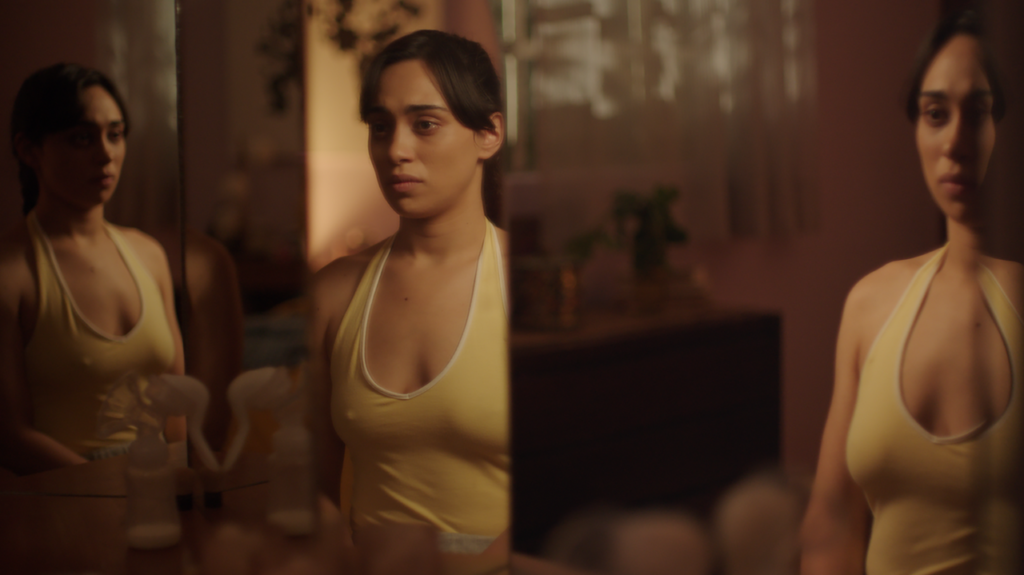
If the Mexican horror movie “Huesera” turned over a blood sample, its genetic makeup might prove startling.
There’s a malignancy inside of Valeria, the young, pregnant wife at the center of Michelle Garza Cervera’s feature debut, and not just because the fetus inside her belly seems hijacked by dark forces. Valeria says she wants a baby—she even prays for conception at the Basilica of Our Lady of Guadalupe—but as we discover more about her past and her secret longings, it becomes abundantly clear that she does not want a baby. What starts as a romantic fable about the joys of expecting mutates into a nightmare about self-betrayal.
The X chromosome of “Huesera,” which screened Monday at the Milwaukee Film Festival, has been passed down from other recent international folk horror with feminine overtones, including Spain’s “Verónica,” Guatemala’s “La Llorona” and Australia’s “You Won’t Be Alone.” But there are also traces of “The Lost Daughter,” an American drama shot in Greece starring the British Olivia Colman as another woman with ambivalent feelings about parenthood that are rarely acknowledged onscreen. Tormented by ghastly visions and specters at the door, Valeria begins to suspect that her prayers have been answered not with a miracle but a curse.
“When you become a mother, you feel like you are split in two,” one character says, but that doesn’t prepare Valeria for how her panic about bodily autonomy and her reluctance to defy family pressures will create a rupture between reality and fantasy. When Valeria’s body starts wrenching itself in bone-cracking ways, “Huesera” signals that it has a Y chromosome inherited from the body horror classics of David Cronenberg, the Canadian master behind “Videodrome” and “The Fly.” Of course, “Huesera” is also a direct descendant of “Rosemary’s Baby,” Roman Polanski’s definitive horror movie about female vulnerability that was distributed by a Los Angeles studio, shot in New York City and directed by a Polish wunderkind.
Given its convoluted genealogy, does it still make sense to label the Spanish-language “Huesera” a “foreign” movie? When a movie’s DNA reveals a bloodline connected to some of my favorite intercontinental films and filmmakers, thinking about it strictly in terms of nationality begins to feel inadequate. Maybe it’s more constructive to regard “Huesera” as a movie made by artists who may not share my homeland nor my mother tongue but otherwise possess a sensibility that wholly matches my own. Their movie may not be in English, but they are still speaking my language.
The Milwaukee Film Festival slotted “Huesera” into its gnarly Cinema Hooligante division, but with its sober arthouse trappings the movie would have been equally at home in the swankier Worldviews category, which imports high-profile works from the global festival circuit. While it’s a bummer that “Huesera” has ended its MFF engagement, the Worldviews strand will continue to verify throughout the festival’s final week that the presence of subtitles might be the least important facet of any movie’s cell structure.
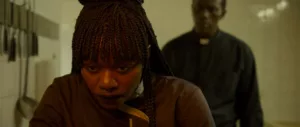
“Our Father, the Devil” (9:45 p.m. Friday, Avalon Theater and 3:45 p.m. Monday, Times Cinema) may sound like a “Huesera” spinoff, but Ellie Foumbi’s psychological mystery is concerned with a more down-to-earth form of malevolence. In one of the festival’s most hypnotic scenes, Marie, a gentle African refugee in the south of France, hears a familiar voice, discovers it belongs to a new, magnetic Catholic priest and promptly faints. Recognizing this man as the warlord who slaughtered her family, Marie embarks on a morally ambiguous path through trauma, scars, revenge and her own troubled past as a child soldier. What’s compelling is how Foumbi, with extraordinary help from lead actors Babetida Sadjo and Souléymane Sy Savané, transforms “Our Father, the Devil” into an enigmatic exploration of the relationship between peace and pain. Might both Marie and the priest deserve forgiveness?
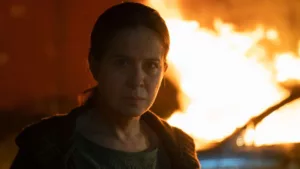
Turning the other cheek doesn’t interest Cielo, the vengeful Mexican housewife at the center of “La Civil” (3:15 p.m. today, Avalon Theater). After her daughter is abducted and held for ransom, Cielo is confronted by cutthroat cartel members, uncaring authorities and untrustworthy locals. Her desperation soon leads to the perpetuation of the cycle of violence. It’s a little mind-blowing to learn that this overt thriller counts among its co-producers Jean-Pierre and Luc Dardenne, since their own “bare realism” style is famously pared down. Yet the brothers’ confidence in director Teodora Mihai has proven prescient: “La Civil” won the Prize of Courage in the Un Certain Regard section of the 2021 Cannes Film Festival.
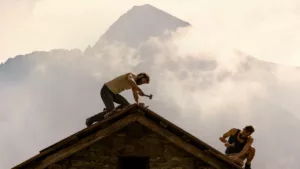
Heavier hardware accompanies “The Eight Mountains” (3 p.m. Friday, Times Cinema and 12:15 p.m. Wednesday, Oriental Theatre), which claimed last year’s Jury Prize at Cannes. Like the Dardennes, directors Felix van Groeningen and Charlotte Vandermeersch hail from Belgium, but their story, about old friends building a cottage together, is set in the picturesque Italian Alps. Those peaks, by all accounts, are fraught with metaphorical meanings—the movie adapts an acclaimed novel about the sloping lives of two men—and perhaps reflect how reconciliation can be a precipitous endeavor.
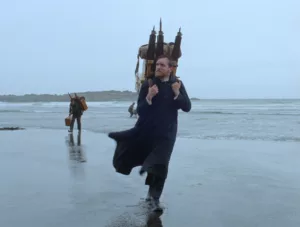
Sweeping landscapes also play an urgent role in “Godland” (1 p.m. Monday, Oriental Theatre), a historical drama about a 19th century Danish missionary traversing perilous terrain to establish a Lutheran church in a remote corner of Iceland. I’m pleased to report that director Hlynur Pálmason is once again working in the same astringent register that gave his two superb previous features, “Winter Brothers” and “A White, White Day,” such elemental power.
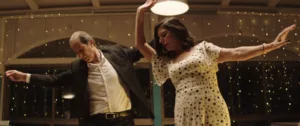
Next to the harsh world of “Godland,” the sleek, cosmopolitan Tel Aviv apartment building where “Karaoke” (3:30 p.m. May 4, Oriental Theatre) takes place may as well be on a different planet. That also describes how Meir and Tova, a married couple in their sixties, feel when they are invited, like aliens, into the dazzling night life of their wealthy neighbor. Moshe Rosenthal’s upscale comedy, which I saw in March, settles for broad themes—the value of self-worth, sustaining the spark of life—but it does contain a trio of mature performances that convey how even deep bonds can be short-circuited by resentment, jealousy and class differences.
Twelve other Worldviews selections will screen during the remaining eight days of the Milwaukee Film Festival, which started April 20 and runs through May 4. The full lineup plus ticket and venue information are online at mkefilm.org/mff.
